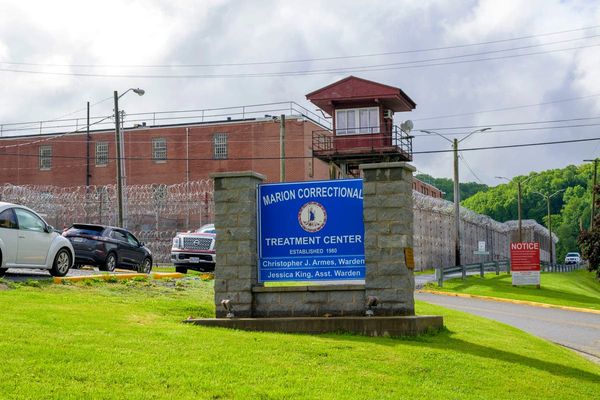
Everyone will have their own moment when they concluded that things were broken, but here’s mine. I was talking to the headteacher of an east London primary school who told me of a pupil who had attempted suicide three times. The head had sought urgent intervention from a range of services, but had had no luck. The services all said they were simply too stretched to help.
I can’t shake that story. I’m haunted by the notion of a child so young and in such distress that they wanted to take their own life. But I think too of the state of our country, where the safety net that should catch such a child is so frayed and torn it is no longer there. Because we all know it’s not just this one area – mental health provision for young people – that’s in a parlous state. The damage is everywhere.
It could be the A&E wards where patients wait all night to be seen, or the ambulances that don’t come, or the trains that don’t work. The prisons that are overcrowded, the courts jammed by backlogs, the military so shrunk by cuts that the brass warn they can no longer defend the country. The classes that are so big, children cannot learn properly. I’m told that when focus groups are asked to describe in a single word the current state of Britain, they come back with “grim”.
You would think the political impact of all this would be obvious: disaster for the incumbent party that has presided over a 13-year hollowing out of the public realm, and a boost for the opposition that seeks to replace it. On one level, that is indeed what is happening. Note the sustained average poll lead for Labour of 20 points or more: proof that voters have looked at the condition of Britain, the evidence of their daily lives, and lost faith in the people in charge.
But that verdict contains foreboding for Labour too. Put crudely, the Tories have smashed up the place so badly, Britons may well instruct Labour to clear up – thereby handing them an increasingly daunting, if not impossible, task. Suddenly, those overcrowded classes and unbearable waiting times will not be reasons to support Labour: they will be Labour’s duty to fix.
The last time the party seemed set to replace a Tory government was in 1997, and then too that meant repairing a public sphere neglected for years. But there is a big difference this time. When Tony Blair took over, the UK economy was growing, the exchequer flush with rising tax receipts. Now the country is not merely at a low point in the economic cycle, when you might assume an upturn is on the way, but in a period of structural decline: growth in labour productivity is lower now than it has been for 250 years. As the economist Adam Tooze puts it, assessing the epoch from the start of the Industrial Revolution until now: “There has literally never been a period of underperformance, of stagnation in labour productivity, of the type that we have seen since the 2010s.”
So a new Labour government would come under immediate pressure to restore services long starved of cash, and yet it will struggle to spend what needs to be spent. The very depth of the hole that got Keir Starmer into Downing Street could swallow him up once he’s there.
Labour’s high command understands the danger. This is why, when Starmer unveiled his “five missions” for government in Manchester on Thursday, he used the phrase “long term” five times, spelling out that some of Labour’s ambitions could not be realised over a mere five years in office. He is already in the business of managing expectations, warning Britons that if they see a country that is broken now, it will take more than one term for Labour to put it back together again (which made it all the odder that he promised to deliver “the highest sustained growth in the G7” within a single parliament).
In the same vein, Starmer is returning to the New Labour playbook and speaking of public service “reform”. To be sure, Starmer and his team genuinely believe that Britain’s crumbling services need more than cash to work better, but they also know that reform is something a new government could actually do, even when money is scarce.
Some Labour supporters will say these are good problems to have, that if the current Tory mess ensures a Labour victory, they can live with the challenge of the clean-up job to come. But it may not be quite as simple as that.
Because no win is guaranteed when the public mood is sceptical, even cynical, about whether politics works. That mood has been reinforced by the appalling behaviour of the Conservatives – the kamikaze administration of Liz Truss, the serial scandals and deceptions of Boris Johnson – but its impact is not confined to the Conservatives. It affects, however unfairly, politics as a whole. The toxic combination of both the conduct and the record of the Tories has left people doubting government’s ability to improve their lives – and that hurts Labour, which believes in an active, interventionist state, especially.
The party sees it in its own focus groups. Even when presented with a small, specific proposal, voters instantly ask how it can be done, how it would be paid for. “People’s belief that even modest change is possible is just rock bottom,” one senior Labour figure tells me. In that context, making Labour’s promise bigger or bolder, as some advocate, is hardly a solution: it would only lead voters to conclude that the party is disconnected from reality.
As a result, Starmer’s first task is to make the case for the efficacy of politics. It’s always better to show rather than tell, which is one reason why the Labour leader likes to point to the transformation he has brought about in his own party. As leader of the opposition, it’s the only major change he can effect. Except Starmer can also cite his record at the Crown Prosecution Service. The aim is the same: to break through the cynicism and prove that politicians can get things done.
This, then, is the paradox of our current politics: that what hurts the Tories helps but also hurts Labour. Yes, the dismal Conservative performance in office has given Labour a fat poll lead, but that failure is understood by too many voters as the failure of politics itself, sapping public confidence that Labour could do any better. That makes a Labour win less certain. More sobering still: even if victory comes, the new government will be staring into a hole so deep, plenty will doubt the country can ever dig itself out.
Jonathan Freedland is a Guardian columnist
In the UK, the youth suicide charity Papyrus can be contacted on 0800 068 4141 or email pat@papyrus-uk.org, and in the UK and Ireland Samaritans can be contacted on freephone 116 123, or email jo@samaritans.org or jo@samaritans.ie. In the US, the National Suicide Prevention Lifeline is at 988 or chat for support. You can also text HOME to 741741 to connect with a crisis text line counselor. In Australia, the crisis support service Lifeline is 13 11 14. Other international helplines can be found at befrienders.org







